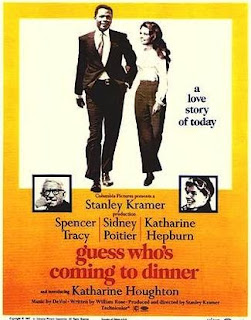Guess Who's Coming to Dinner?
Also nominated for Best Picture in 1967 is one of Stanley Kramer's well-intentioned but ultimately dated exercises in liberal guilt, Guess Who's Coming to Dinner? It was released almost exactly 50 years ago, and at the time was quite shocking--it showed the first screen interracial kiss, and was the first film to deal with miscegenation in a positive light.
Kramer did this by using old film tropes and old stars--it ended up being more about the leads--Spencer Tracy and Katharine Hepburn. It was their ninth and last teaming, and Tracy died just seventeen days after filming ending. The producers could not get insurance for him, and his bad health was apparent to everyone.
Anyhow, the plot is set in motion by their daughter, Katharine Houghton (Hepburn's real-life niece) arriving home with a surprise--a fiance. Only he's black. This shocks Hepburn, who learns of it first, but she's quickly on board. Tracy plays a liberal newspaper publisher whose objections were often heard to this kind of marriage--the problems they will encounter, especially their children. It was a way to sound noble while exhibiting his racism, which he never had to encounter before.
Eventually Poitier's parents arrive (his mother, Beah Richards, is also immediately for the union) but his father is even more stubborn than Tracy, a sideways shot at the conservatism of pre-King blacks (the maid, played by Isabel Sanford, is also against). The story is structured like a play, with characters pairing up for conversations. It ends with Tracy giving about a five-minute speech, his valedictory, declaring "In the final analysis, it doesn't matter a damn what we think. It's how they feel." He then goes to declare his love for his wife, and Hepburn looks on with tears in her eyes, knowing he was dying, and knowing they were each other's great loves. It puts the racial aspects of the film on the back burner.
The film is very witty and well-acted, but it makes a critical mistake in retrospect that Kramer knew he had to make. The film portrays Poitier as perfect. He has no flaws. He's a doctor who has done everything but win the Nobel Prize. He hasn't even gone to bed with Houghton. But he had to be perfect, since that would have made the only reason to be against the marriage to be racial. With seventeen states still having anti-miscegenation laws on the books (it was before Loving v. Virginia was decided, ending them), the point was race. A movie today, when mixed race marriage is much more acceptable, would have to made both man and wife (Houghton was pretty much perfect, too) more realistic.
Guess Who's Coming to Dinner? received Oscar nominations in all four acting categories. Cecil Kellaway, as a nosy priest friend, was in the Supporting Actor category, Richards in Supporting Actress. Hepburn won, her second Oscar (she was only halfway done). Tracy's wife was in the audience should he win posthumously. but he didn't. He lost to Rod Steiger in In the Heat of the Night, the next film I will discuss.
Kramer did this by using old film tropes and old stars--it ended up being more about the leads--Spencer Tracy and Katharine Hepburn. It was their ninth and last teaming, and Tracy died just seventeen days after filming ending. The producers could not get insurance for him, and his bad health was apparent to everyone.
Anyhow, the plot is set in motion by their daughter, Katharine Houghton (Hepburn's real-life niece) arriving home with a surprise--a fiance. Only he's black. This shocks Hepburn, who learns of it first, but she's quickly on board. Tracy plays a liberal newspaper publisher whose objections were often heard to this kind of marriage--the problems they will encounter, especially their children. It was a way to sound noble while exhibiting his racism, which he never had to encounter before.
Eventually Poitier's parents arrive (his mother, Beah Richards, is also immediately for the union) but his father is even more stubborn than Tracy, a sideways shot at the conservatism of pre-King blacks (the maid, played by Isabel Sanford, is also against). The story is structured like a play, with characters pairing up for conversations. It ends with Tracy giving about a five-minute speech, his valedictory, declaring "In the final analysis, it doesn't matter a damn what we think. It's how they feel." He then goes to declare his love for his wife, and Hepburn looks on with tears in her eyes, knowing he was dying, and knowing they were each other's great loves. It puts the racial aspects of the film on the back burner.
The film is very witty and well-acted, but it makes a critical mistake in retrospect that Kramer knew he had to make. The film portrays Poitier as perfect. He has no flaws. He's a doctor who has done everything but win the Nobel Prize. He hasn't even gone to bed with Houghton. But he had to be perfect, since that would have made the only reason to be against the marriage to be racial. With seventeen states still having anti-miscegenation laws on the books (it was before Loving v. Virginia was decided, ending them), the point was race. A movie today, when mixed race marriage is much more acceptable, would have to made both man and wife (Houghton was pretty much perfect, too) more realistic.
Guess Who's Coming to Dinner? received Oscar nominations in all four acting categories. Cecil Kellaway, as a nosy priest friend, was in the Supporting Actor category, Richards in Supporting Actress. Hepburn won, her second Oscar (she was only halfway done). Tracy's wife was in the audience should he win posthumously. but he didn't. He lost to Rod Steiger in In the Heat of the Night, the next film I will discuss.



Comments
Post a Comment